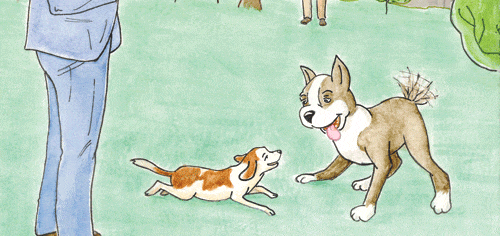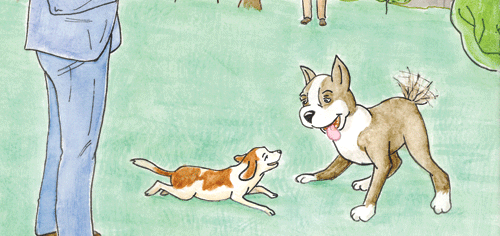

Dog Park Prejudice: Big Dog vs Small Dog
ONE SUNNY SATURDAY LAST SUMMER, MY 85-POUND LAB-SHEPHERD CROSS, SOOKE, and I found ourselves sniffing around a swank canine boutique in search of a fabulous new collar and, naturally, a few complimentary treats. Brimming over with X-X-S four-legged fashions, the trendy yet tiny store offered about as much floor space as a Twister mat and, with a large dog in tow, felt marginally more comfortable.
As if our physical surroundings weren’t enough to make us long for the canine equivalent to Big & Tall, the fact that the boutique’s lone sales associate went out of her way to completely ignore us-despite the fact that we were her only customers-made the point clear enough. But just in case we missed it, the arrival of a new customer and her Miniature Pinscher left little room for doubt.
Going from zero to friendly in 1.3 seconds, the now-bubbly saleswoman was all pats and smiles, reaching behind the counter to reveal a stash of gourmet treats as Sooke looked on drooling and my blood simmered.
I’d like to think that we dog people are a pretty tolerant bunch. I mean, you’d have to be to put up with all the barking, whining, shedding, chewing, growling, scratching, digging, and pooping. And yet, though many of us wouldn’t dream of discriminating against other human beings on the basis of their race or physical characteristics, getting snubbed got me thinking about whether dog owners discriminate against each other’s dogs on the basis of their breed and/or size.
To be clear, I’m not talking about breed-specific legislation: that’s another topic entirely, and a far more serious one at that. I’m simply observing the way that some of us perceive and treat each other-be it consciously or unconsciously. But before I look at other people’s attitudes, I think it’s only fair to examine my own.
Despite owning a large mixed breed, I consider myself to be someone who likes all dogs. Though having said that, I’d be lying if I didn’t come clean about having felt slightly embarrassed on a few occasions when, while dog-sitting for various friends, I’ve had to walk Toy dogs around my neighbourhood.
The root of this embarrassment is clearly a holdover from my childhood and the large dog-loving adults in my life who universally referred to small dogs as "slipper dogs." Though never explicitly stated, it was implied that there was something slightly odd about owning a dog that, in their opinion, bore a stronger resemblance to fuzzy footwear than a wolf.
Paradoxically, my family actually owned a small dog for the better part of my childhood, a so-ugly-she’s-cute Heinz 57 named Ozzie whose diminutive stature was overlooked by my otherwise sizist parents on account of her having, according to them, "the personality of a big dog."
Interestingly enough, my parents aren’t the only people I know who rationalize small-dog ownership in this way. Just last week, I spoke to a woman who insisted her Jack Russell Terrier was, in fact, "a big dog trapped in a little dog’s body."
A loose survey of random dog owners shows further support for a small dog/big dog dichotomy. About two out of every three people I spoke to had a strong predisposition one way or the other, with many quick to identify themselves as either a "big dog person" or a "small dog person."
Many didn’t stop there, however. Some, albeit jokingly, went on to disparage larger dogs as "fur pigs" and "gigantic, noisy, poop machines," while other dismissed smaller dogs as "purse dogs," "Paris dogs," and "little white fluffies."
Some even went so far as to question canine status. Said one Husky owner, "I don’t consider small dogs [as] dogs: they’re accessories. I could never own a dog that’s smaller than any cat I’ve had."
On the other side of the size divide, a Boston Terrier owner, nodding in the direction of a couple of Great Danes lumbering towards us at one of our local dog parks, quipped, "Those aren’t dogs: they’re horses."
Like size, breed is another common bias for certain dog owners, with breedist sentiment typically falling into one of two general categories: "pure breed"-ists, of which there are as many subcategories are there are breeds, and "mixed breed"- ists, of which there are infinite variations.
I remember meeting a pure breedist at my local dog beach. From behind gargantuan designer sunglasses, the well-heeled 40-something woman disdainfully surveyed the rag tag collection of mongrels tearing up and down the shoreline with her glossy Irish Setter before remarking without a hint of irony, "This isn’t Red’s usual set." She then went on to list off half a dozen of Red’s regular purebred playmates.
In addition to being a sizist, my father also happens to be a mixed breedist, having only ever owned Lab crosses, all of which, with the exception of his current dog, have been black. (As a random footnote, I’ll also add that my Dad has a bizarre tendency to give consecutive dogs the same, ridiculously lame, names. So far, he’s had two Marks, posthumously referred to as Mark I and Mark II, and is now on his second Jerry-Lee.)
Many pure breedists defend their preference by arguing that purebred dogs are, generally speaking, more predictable in terms of size and temperament; a big plus when less predictable factors, such as children, are part of the equation.
Some mixed breedists wear their mutt ownership as sort of a badge with an almost non conformist, indie pride. Many are quick to dismiss purebred ownership as a transparent attempt to use a pet to telegraph elite social status. Says one mixed breedist, "People buy purebreds for the same reason they buy Mercedes: to let everyone else know how much money they have."
We all know it’s natural to have preferences. Some people love chocolate ice cream. Others love vanilla. Some love Chihuahuas. Others love Bouviers. In this regard, there’s nothing inherently wrong with having a preference for a particular size or breed of dog. It’s only a problem when we prejudge other dogs and their owners on the basis of these differences.
Sure, dog owners like to tease each other, but all jokes aside, I’d like to think that underneath it all, we still recognize that regardless of whether we prefer big or small, pure or mixed, we’re all still dog people-united by our love of wet noses and sloppy kisses and with a shared commitment to equal treats for all. ■
Melanie Carson is a Vancouver-based writer and reformed mixed-breedist who has, in recent months, been furthering her cross-canine understanding by looking after a friend’s Boston Terrier puppy. Her five-year-old Lab-Shepherd cross is not amused.
Join the newsletter and never miss out on dog content again!
"*" indicates required fields
By clicking the arrow, you agree to our web Terms of Use and Privacy & Cookie Policy. Easy unsubscribe links are provided in every email.